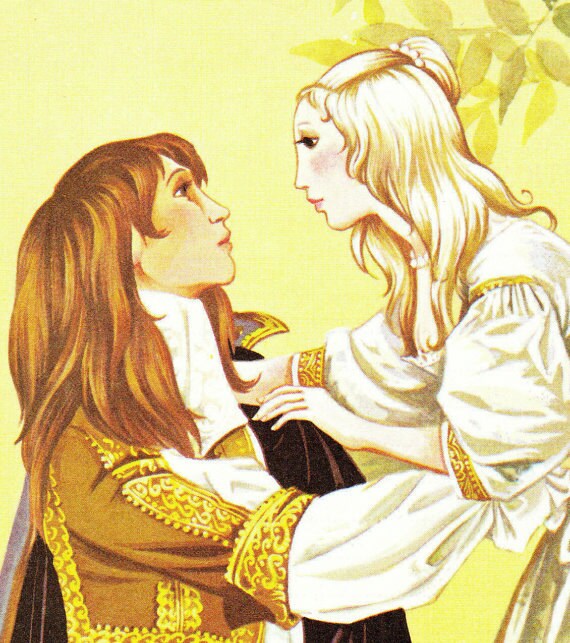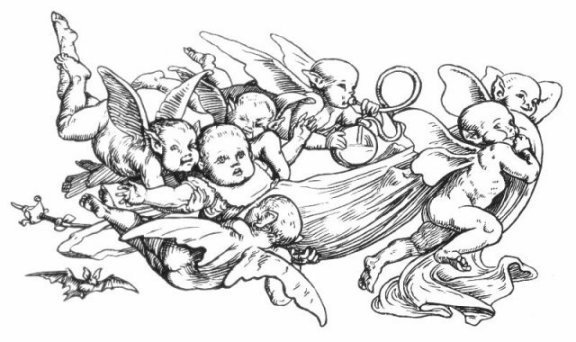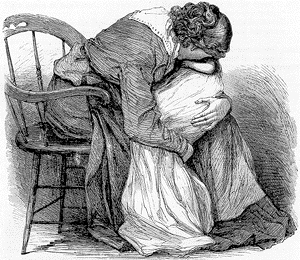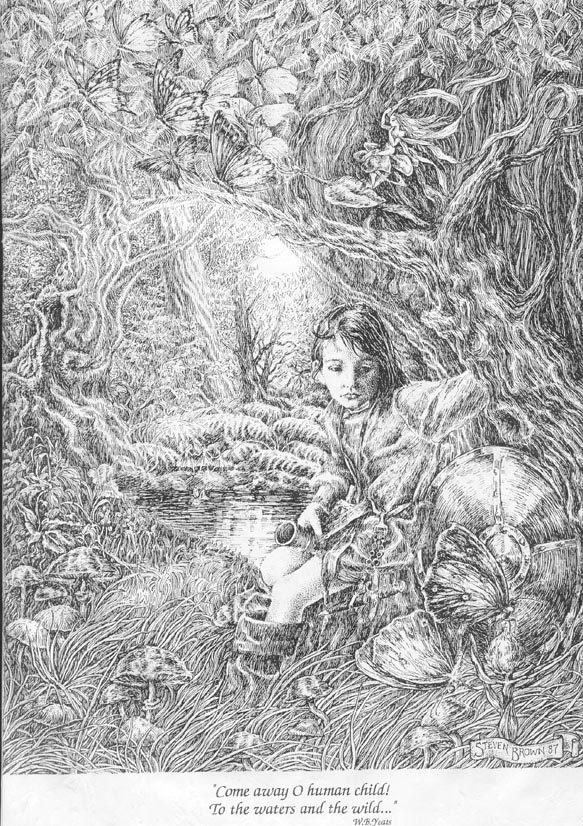 |
| Rising in the East, by DarrilAsylum on DeviantART |
Tale as old as time
True as it can be
Barely even friends
Then somebody bends
Unexpectedly
Just a little change
Small to say the least
Both a little scared
Neither one prepared
Beauty and the beast
Ever just the same
Ever a surprise
Ever as before and ever just as sure as the sun will rise
*Disney's Beauty and the Beast, Title Song
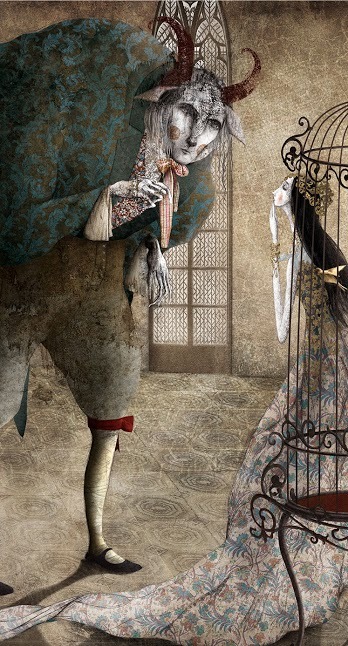 |
| Beauty & the Beast by Gabriel Pacheco |
While simple in execution these
words paint an emotion harnessed by the classic
Beauty and the Beast. Beauty and the Beast rests upon the minds shelf next
to the likes of Cinderella, Sleeping Beauty and Rapunzel. And while it seems
this is where it belongs it is incomparable to the others. Most princess tales
follow a heroine who is catapult into adversity by an enchantment or social displacement.
While Beauty and the Beast graces those common threads it provides a deeper
exploration into compassion, a journey where the heroines destiny is to unveil
another’s truth. Its message is in ways within the title and perhaps often
overlooked, Beauty and the Beast or the Beauty
in the Beast.
 |
| Beauty & the Beast by Anne Anderson |
Beauty and the Beast is easily attributed
to the likes of the Brothers Grimm but like so many works was a collected tale.
There is a noble eloquence and sensual dynamic that allegorically represents
the country of its origin, France. While
the tale was originally conceived by novelist Gabrielle-Suzanne Barbot de Villeneuve, in 1740(,it is believed by
scholars at multiple universities that tale is older than 4,ooo years). The original tale was exceptionally lengthy
and later abridged and rewritten by Jeanne-Marie
Leprince de Beaumont, in 1756. This version which appeared in Magasin des enfants is the common
version we are now familiar with. Both women contributed to the overall essence
and emotional core of this tale, perhaps this is why the tale stands a bit on
its own. These tales in turn would eventually see adaptations throughout the
whole of Europe with incarnations on the stage with theatre and opera.
The later abridged tale is as
follows:
Beauty
and the Beast:
Jeanne-Marie LePrince de Beaumont
 |
| Gordon Laite 1959 |
The youngest, as
she was handsomer, was also better than her sisters. The two eldest had a great
deal of pride, because they were rich. They gave themselves ridiculous airs,
and would not visit other merchants' daughters, nor keep company with any but
persons of quality. They went out every day to parties of pleasure, balls,
plays, concerts, and so forth, and they laughed at their youngest sister,
because she spent the greatest part of her time in reading good books.
As it was known
that they were great fortunes, several eminent merchants made their addresses
to them; but the two eldest said, they would never marry, unless they could
meet with a duke, or an earl at least. Beauty very civilly thanked them that
courted her, and told them she was too young yet to marry, but chose to stay
with her father a few years longer.
 |
| Mercer Mayer |
When they came
to their country house, the merchant and his three sons applied themselves to
husbandry and tillage; and Beauty rose at four in the morning, and made haste
to have the house clean, and dinner ready for the family. In the beginning she
found it very difficult, for she had not been used to work as a servant, but in
less than two months she grew stronger and healthier than ever. After she had
done her work, she read, played on the harpsichord, or else sung whilst she
spun.
On the contrary,
her two sisters did not know how to spend their time; they got up at ten, and
did nothing but saunter about the whole day, lamenting the loss of their fine
clothes and acquaintance. "Do but see our youngest sister," said
they, one to the other, "what a poor, stupid, mean-spirited creature she
is, to be contented with such an unhappy dismal situation."
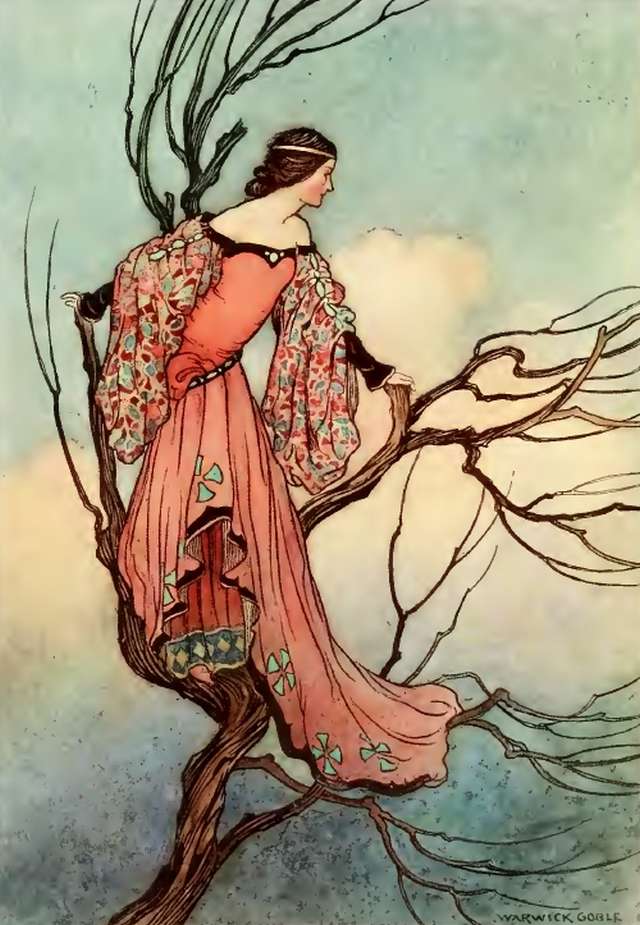 |
| Warwick Goble |
The family had
lived about a year in this retirement, when the merchant received a letter with
an account that a vessel, on board of which he had effects, was safely arrived.
This news had liked to have turned the heads of the two eldest daughters, who
immediately flattered themselves with the hopes of returning to town, for they
were quite weary of a country life; and when they saw their father ready to set
out, they begged of him to buy them new gowns, headdresses, ribbons, and all
manner of trifles; but Beauty asked for nothing for she thought to herself,
that all the money her father was going to receive, would scarce be sufficient
to purchase everything her sisters wanted.
"What will
you have, Beauty?" said her father.
 |
| Hilary Knight 1990 |
The good man
went on his journey, but when he came there, they went to law with him about
the merchandise, and after a great deal of trouble and pains to no purpose, he
came back as poor as before.
He was within
thirty miles of his own house, thinking on the pleasure he should have in
seeing his children again, when going through a large forest he lost himself.
It rained and snowed terribly; besides, the wind was so high, that it threw him
twice off his horse, and night coming on, he began to apprehend being either
starved to death with cold and hunger, or else devoured by the wolves, whom he
heard howling all round him, when, on a sudden, looking through a long walk of
trees, he saw a light at some distance, and going on a little farther perceived
it came from a palace illuminated from top to bottom. The merchant returned God
thanks for this happy discovery, and hastened to the place, but was greatly
surprised at not meeting with any one in the outer courts. His horse followed
him, and seeing a large stable open, went in, and finding both hay and oats,
the poor beast, who was almost famished, fell to eating very heartily; the
merchant tied him up to the manger, and walking towards the house, where he saw
no one, but entering into a large hall, he found a good fire, and a table
plentifully set out with but one cover laid. As he was wet quite through with
the rain and snow, he drew near the fire to dry himself. "I hope,"
said he, "the master of the house, or his servants will excuse the liberty
I take; I suppose it will not be long before some of them appear."
 |
| Eleanor Vere Boyle |
The good man
drank his chocolate, and then went to look for his horse, but passing through
an arbor of roses he remembered Beauty's request to him, and gathered a branch
on which were several; immediately he heard a great noise, and saw such a
frightful Beast coming towards him, that he was ready to faint away.
 |
"You are
very ungrateful," said the Beast to him, in a terrible voice; "I have
saved your life by receiving you into my castle, and, in return, you steal my
roses, which I value beyond any thing in the universe, but you shall die for
it; I give you but a quarter of an hour to prepare yourself, and say your
prayers."
The merchant
fell on his knees, and lifted up both his hands, "My lord," said he,
"I beseech you to forgive me, indeed I had no intention to offend in
gathering a rose for one of my daughters, who desired me to bring her
one."
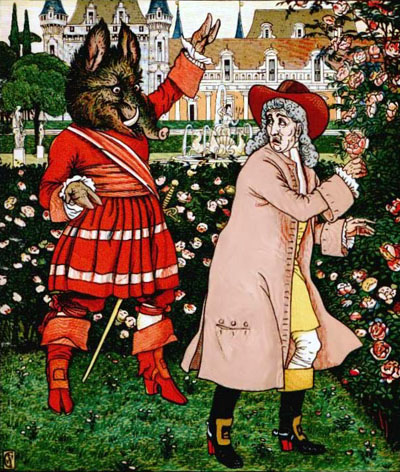 |
| Walter Crane |
The merchant had
no mind to sacrifice his daughters to the ugly monster, but he thought, in
obtaining this respite, he should have the satisfaction of seeing them once
more, so he promised, upon oath, he would return, and the Beast told him he
might set out when he pleased, "but," added he, "you shall not
depart empty handed; go back to the room where you lay, and you will see a
great empty chest; fill it with whatever you like best, and I will send it to
your home," and at the same time Beast withdrew.
"Well,"
said the good man to himself, "if I must die, I shall have the comfort, at
least, of leaving something to my poor children." He returned to the
bedchamber, and finding a great quantity of broad pieces of gold, he filled the
great chest the Beast had mentioned, locked it, and afterwards took his horse
out of the stable, leaving the palace with as much grief as he had entered it
with joy. The horse, of his own accord, took one of the roads of the forest,
and in a few hours the good man was at home.
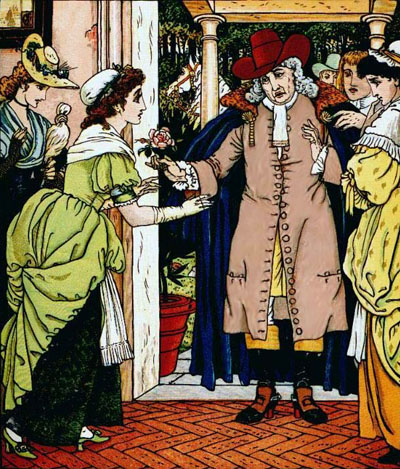 |
| Walter Crane |
"Do but see
the pride of that little wretch," said they; "she would not ask for
fine clothes, as we did; but no truly, Miss wanted to distinguish herself, so
now she will be the death of our poor father, and yet she does not so much as
shed a tear."
"Why should
I," answered Beauty, "it would be very needless, for my father shall
not suffer upon my account, since the monster will accept of one of his
daughters, I will deliver myself up to all his fury, and I am very happy in
thinking that my death will save my father's life, and be a proof of my tender
love for him."
"No,
sister," said her three brothers, "that shall not be, we will go find
the monster, and either kill him, or perish in the attempt."
"Do not
imagine any such thing, my sons," said the merchant, "Beast's power
is so great, that I have no hopes of your overcoming him. I am charmed with
Beauty's kind and generous offer, but I cannot yield to it. I am old, and have
not long to live, so can only loose a few years, which I regret for your sakes
alone, my dear children."
"Indeed
father," said Beauty, "you shall not go to the palace without me, you
cannot hinder me from following you." It was to no purpose all they could
say. Beauty still insisted on setting out for the fine palace, and her sisters
were delighted at it, for her virtue and amiable qualities made them envious
and jealous.
The merchant was
so afflicted at the thoughts of losing his daughter, that he had quite forgot
the chest full of gold, but at night when he retired to rest, no sooner had he
shut his chamber door, than, to his great astonishment, he found it by his
bedside; he was determined, however, not to tell his children, that he was
grown rich, because they would have wanted to return to town, and he was resolved
not to leave the country; but he trusted Beauty with the secret, who informed
him, that two gentlemen came in his absence, and courted her sisters; she
begged her father to consent to their marriage, and give them fortunes, for she
was so good, that she loved them and forgave heartily all their ill usage.
These wicked creatures rubbed their eyes with an onion to force some tears when
they parted with their sister, but her brothers were really concerned. Beauty
was the only one who did not shed tears at parting, because she would not
increase their uneasiness.
 |
| Mercer Mayer |
The beast
responded, "You are very good, and I am greatly obliged to you; honest
man, go your ways tomorrow morning, but never think of coming here again."
"Farewell
Beauty, farewell Beast," answered he, and immediately the monster
withdrew. "Oh, daughter," said the merchant, embracing Beauty,
"I am almost frightened to death, believe me, you had better go back, and
let me stay here."
"No,
father," said Beauty, in a resolute tone, "you shall set out tomorrow
morning, and leave me to the care and protection of providence." They went
to bed, and thought they should not close their eyes all night; but scarce were
they laid down, than they fell fast asleep, and Beauty dreamed, a fine lady
came, and said to her, "I am content, Beauty, with your good will, this
good action of yours in giving up your own life to save your father's shall not
go unrewarded." Beauty waked, and told her father her dream, and though it
helped to comfort him a little, yet he could not help crying bitterly, when he
took leave of his dear child.
As soon as he
was gone, Beauty sat down in the great hall, and fell a crying likewise; but as
she was mistress of a great deal of resolution, she recommended herself to God,
and resolved not to be uneasy the little time she had to live; for she firmly
believed Beast would eat her up that night.
 |
| Beauty & the Beast by Hilary Knight |
Welcome Beauty,
banish fear,
You are queen and mistress here.
Speak your wishes, speak your will,
Swift obedience meets them still.
"Alas,"
said she, with a sigh, "there is nothing I desire so much as to see my
poor father, and know what he is doing." She had no sooner said this, when
casting her eyes on a great looking glass, to her great amazement, she saw her
own home, where her father arrived with a very dejected countenance. Her
sisters went to meet him, and notwithstanding their endeavors to appear
sorrowful, their joy, felt for having got rid of their sister, was visible in
every feature. A moment after, everything disappeared, and Beauty's
apprehensions at this proof of Beast's complaisance.
"That is as
you please," answered Beauty trembling.
"No,"
replied the Beast, "you alone are mistress here; you need only bid me
gone, if my presence is troublesome, and I will immediately withdraw. But, tell
me, do not you think me very ugly?"
"That is
true," said Beauty, "for I cannot tell a lie, but I believe you are
very good natured."
"So I
am," said the monster, "but then, besides my ugliness, I have no
sense; I know very well, that I am a poor, silly, stupid creature."
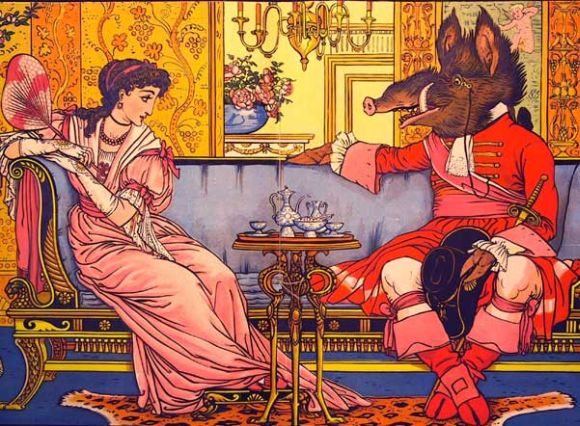 |
| Walter Crane |
"Eat then,
Beauty," said the monster, "and endeavor to amuse yourself in your
palace, for everything here is yours, and I should be very uneasy, if you were
not happy."
"You are
very obliging," answered Beauty, "I own I am pleased with your
kindness, and when I consider that, your deformity scarce appears."
"Yes,
yes," said the Beast, "my heart is good, but still I am a
monster."
 |
| Eleanor Vere Boyle |
She was some
time before she dared answer, for she was afraid of making him angry, if she
refused. At last, however, she said trembling, "no Beast."
Immediately the poor monster went to sigh, and hissed so frightfully, that the
whole palace echoed. But Beauty soon recovered her fright, for Beast having
said, in a mournful voice, "then farewell, Beauty," left the room;
and only turned back, now and then, to look at her as he went out.
When Beauty was
alone, she felt a great deal of compassion for poor Beast. "Alas,"
said she, "'tis thousand pities, anything so good natured should be so
ugly."
 |
| Paul Gustave Louis Chistophe Dore |
"I must," said the Beast, "for, alas! I know too well my own misfortune, but then I love you with the tenderest affection. However, I ought to think myself happy, that you will stay here; promise me never to leave me."
"I had
rather die myself," said the monster, "than give you the least uneasiness.
I will send you to your father, you shall remain with him, and poor Beast will
die with grief."
"No,"
said Beauty, weeping, "I love you too well to be the cause of your death.
I give you my promise to return in a week. You have shown me that my sisters
are married, and my brothers gone to the army; only let me stay a week with my
father, as he is alone."
 |
| Beauty & the Beast by Brent Hollowell |
Beauty dressed
herself, and in the meantime they sent to her sisters who hastened thither with
their husbands. They were both of them very unhappy. The eldest had married a
gentleman, extremely handsome indeed, but so fond of his own person, that he
was full of nothing but his own dear self, and neglected his wife. The second
had married a man of wit, but he only made use of it to plague and torment
everybody, and his wife most of all. Beauty's sisters sickened with envy, when
they saw her dressed like a princess, and more beautiful than ever, nor could
all her obliging affectionate behavior stifle their jealousy, which was ready
to burst when she told them how happy she was. They went down into the garden
to vent it in tears; and said one to the other, in what way is this little
creature better than us, that she should be so much happier?
"Sister," said the oldest, "a thought just strikes my mind; let
us endeavor to detain her above a week, and perhaps the silly monster will be
so enraged at her for breaking her word, that he will devour her."
 |
| Beauty by Janet and Anne Grahame Johnstone 1977 |
In the meantime,
Beauty could not help reflecting on herself, for the uneasiness she was likely
to cause poor Beast, whom she sincerely loved, and really longed to see again.
The tenth night she spent at her father's, she dreamed she was in the palace
garden, and that she saw Beast extended on the grass plat, who seemed just
expiring, and, in a dying voice, reproached her with her ingratitude. Beauty
started out of her sleep, and bursting into tears. "Am I not very
wicked," said she, "to act so unkindly to Beast, that has studied so
much, to please me in everything? Is it his fault if he is so ugly, and has so
little sense? He is kind and good, and that is sufficient. Why did I refuse to
marry him? I should be happier with the monster than my sisters are with their
husbands; it is neither wit, nor a fine person, in a husband, that makes a
woman happy, but virtue, sweetness of temper, and complaisance, and Beast has
all these valuable qualifications. It is true, I do not feel the tenderness of
affection for him, but I find I have the highest gratitude, esteem, and
friendship; I will not make him miserable, were I to be so ungrateful I should
never forgive myself." Beauty having said this, rose, put her ring on the
table, and then laid down again; scarce was she in bed before she fell asleep,
and when she waked the next morning, she was overjoyed to find herself in the
Beast's palace.
 |
| Edmund Dulac |
"No, dear
Beast," said Beauty, "you must not die. Live to be my husband; from
this moment I give you my hand, and swear to be none but yours. Alas! I thought
I had only a friendship for you, but the grief I now feel convinces me, that I
cannot live without you." Beauty scarce had pronounced these words, when
she saw the palace sparkle with light; and fireworks, instruments of music,
everything seemed to give notice of some great event. But nothing could fix her
attention; she turned to her dear Beast, for whom she trembled with fear; but
how great was her surprise! Beast was disappeared, and she saw, at her feet,
one of the loveliest princes that eye ever beheld; who returned her thanks for
having put an end to the charm, under which he had so long resembled a Beast.
Though this prince was worthy of all her attention, she could not forbear
asking where Beast was.
"You see
him at your feet, said the prince. A wicked fairy had condemned me to remain
under that shape until a beautiful virgin should consent to marry me. The fairy
likewise enjoined me to conceal my understanding. There was only you in the
world generous enough to be won by the goodness of my temper, and in offering
you my crown I can't discharge the obligations I have to you."
 |
| The Prince by PJ Lynch |
"Beauty,"
said this lady, "come and receive the reward of your judicious choice; you
have preferred virtue before either wit or beauty, and deserve to find a person
in whom all these qualifications are united. You are going to be a great queen.
I hope the throne will not lessen your virtue, or make you forget yourself. As
to you, ladies," said the fairy to Beauty's two sisters, "I know your
hearts, and all the malice they contain. Become two statues, but, under this
transformation, still retain your reason. You shall stand before your sister's
palace gate, and be it your punishment to behold her happiness; and it will not
be in your power to return to your former state, until you own your faults, but
I am very much afraid that you will always remain statues. Pride, anger,
gluttony, and idleness are sometimes conquered, but the conversion of a malicious
and envious mind is a kind of miracle."
 |
| The Fairy by Edmund Dulac 1910 |
•Source: The Young Misses Magazine, Containing
Dialogues between a Governess and Several Young Ladies of Quality Her Scholars,
by Madam Prince de Beaumont, 4th ed., v. 1 (London: C. Nourse, 1783), pp.
45-67. First published in 1756 in France under the title Magasin des enfans, ou
dialogues entre une sage gouvernante et plusieure de ses élèves. The first
English translation appeared in 1757.
•Spelling and punctuation revised by D. L. Ashliman.
Jacob and
Wilhelm Grimm adapted the tale with two different versions. The Summer and Winter Garden simply
takes the original tale shortens it, to become an early bedtime adaptation. The
omission of deeper plot and character developments fashion the tale in a way
more accessible to children, there is no enchantress/fairy and the brief
mention of Beauty’s sisters paints them benevolently. The Singing, Springing Lark repaints the entire tale. In this
version the Beast is a Lion and the rose is a singing lark. The prince’s
enchantment is known as he changes by night back into a human. Many elements
expand the simple tale. There is another enchantment in this version that
transforms the prince into a dove, there is a wicked princess and a sorcerer as
well. Although these elements change the story significantly though the common
thread of compassion is still present.
 |
| Eric Canete |
Jim Henson
combined elements of both The Summer and
Winter Garden and The Singing,
Springing Lark with another Grimm classic for his HBO program The Storyteller. The Storyteller was produced as a nine part
fairytale series in 1987 by HBO, this was perhaps a direct response to the
success of Shelley Duvall’s Fairytale
Theatre which began in 1982 on Showtime. While both programs found clever
ways to present old tales Jim Henson combined elements of multiple stories to
develop unique pieces, much in the tradition of The Brothers Grimm. The program
utilized cutting edge artistry, pre CGI, to fashion puppets and surreal
landscapes, creating a mystical and sometimes macabre world. The show,
developed by Anthony Minghella explored folktales told throughout Europe. The
Storyteller won multiple awards including an Emmy for Outstanding Programing
for Children with an episode titled: Hans
my Hedgehog, which in many ways payed homage to Beauty and the Beast. It is
perhaps one of Jim Henson’s crowning achievements.
“From an early German folk tale of the same
name. A farmer's wife drives her husband mad with her desperate measures to
have a baby. She says to him that she wants a child so badly, she would not
care how he looked even if he were covered in quills like a hedgehog. That, of
course, is what she gets: a baby covered in quills, as soft as feathers. His
mother calls him 'Hans My Hedgehog' and she is the only one to love him; his
father grows to hate him for shame. So eventually Hans leaves for a place where
he cannot hurt anyone and where no-one can hurt him.
 |
| Jim Henson Studios 1987 |
A year and one day later Hans returns to the
castle. The princess says she knows what she must do. Hans asks her if she
finds him ugly and she replies that he is not nearly as ugly as a broken
promise. They are married, to the dismay of the entire kingdom. On their
wedding night, the princess awaits her husband in bed. He comes into the
chamber with his bagpipes and takes a seat by the fire and begins to play the
same beautiful music that saved the king a year prior. The Princess is soothed
by the music and dozes off. She wakes and finds a pelt of quills as soft as
feathers on the ground before the fire. She sees her husband in the form of a
handsome young man freeing the animals of the castle, to live with his friends
in his forest castle. He knows she has seen him when he finds her slumbering on
the discarded quills the following night. He tells her that he is bewitched and
only if she can keep his secret for one more night can he be freed and remain in
the form of the handsome man. She agrees.
 |
| Hans my Hedgehog by James Barker |
The next morning at breakfast the Queen
inquires why her daughter is so cheerful. The Princess tries to resist but as
her mother pries she gives in and tells her that Hans is bewitched. The Queen
says that the only way to reverse the spell is to fling the quills in the fire.
That night when Hans sheds his quills, she obeys her mother and burns them. She
hears his screams of pain as if he were aflame, and Hans runs from the castle.
 |
| Hans my Hedgehog by Yael Albert |
---Wikipedia
Modern culture has time and time again observed and recreated this tale. Outside of television there have been several motion picture attempts. The earliest, a French version, La Belle et la Bete was produced in 1946 and directed by Jean Cocteau. This film artistically inspired many other later versions, including Shelly Duvall’s Fairytale Theatre and the 1991 Disney Film. Cocteau’s 1946 film draws viewers into a dark and ominous world rich with gothic flare, a visual splendor and spectacle where the enchanted castle is every bit as foreboding as the cursed prince. This production utilized the canvas of black and white film making to remarkable effect. Many artistic choices developed by this film have been accepted and adapted into the story’s tradition. For instance, Cocteau’s film developed a suitor for Belle and anthropomorphized the enchanted objects within the castle, such as the candelabras. One cannot argue the similarity in the enchanted Disney character Lumiere. Jean Cocteau’s film richly paints a grand ballroom and the subtle intimacy between the beauty and the beast that will surely inspire every visual adaptation. The film in its entirety can be viewed here: Jean Cocteau’s Beauty and the Beast
It would be hard
to discuss the impact of this tale in modern culture and not refer to Disney’s
1991 masterpiece. Beauty and the Beast was first optioned by Walt Disney after
the success of Snow White and the Seven Dwarves in 1937, then later in the
1950’s only to be shelved until the wild success of The Little Mermaid. Walt
Disney Studios have from time to time been seriously criticized for deterring
from source material. Disney’s Beauty and the Beast pays a distinct tribute to
the source material as well as the Jean Cocteau film, it is 2nd in
what is called Disney Animation’s Golden Age, it was produced immediately after
the success of The Little Mermaid. A large portion of the magic within this
film can be attributed to the music which was composed by Alan Menken with
lyrics by Howard Ashman. During the development of the film Howard Ashman
fought for the proper characterization of the beast, demanding the distinct
attention. This was a quality he had brought to Disney’s The Little Mermaid in
1989, when he demanded that the title song ‘Part of your World’ not be cut. Ashman
died eight months before the film was released due to Aids complications and
the film was dedicated to his honor. The following words are found in the
credits: "To our friend Howard, who
gave a mermaid her voice and a beast his soul, we will be forever grateful.”
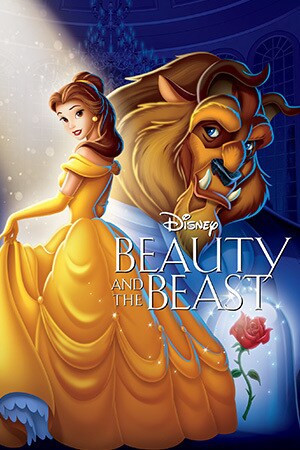 |
| Walt Disney Pictures 1991 |
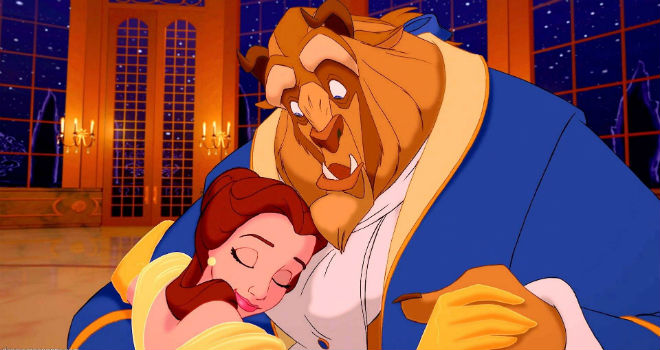 |
| Walt Disney Pictures 1991 |
The Library of Congress selected the
film in 2002 to be preserved in the National Film Registry for being "culturally,
historically, (and)… aesthetically significant". In 1994 it was the first
animated film to be turned into a successful Broadway Musical, a live action
translation is also currently in development and set to be released in 2017
with Alan Menken returning to score the film.
 |
| Pathe Films 2014 |
Beauty and the Beast rests historically next to
the likes of Cinderella and Sleeping Beauty but it is a fairytale unique to
itself. The tale has at times been criticized for having an inappropriate
message; the harsh attitude of the beast and the imprisonment of maiden is reviewed as oppressive towards women. These unsophisticated ideas poke around
elements of an evolved fireside story. A deeper analysis of the original work
and its adaptation will display the courage and compassion it takes to view
someone’s soul purely and uninhibited. Beauty and the Beast is one of the most
remarkable fairytales because it explores the deeper wisdom associated to
compassion, not to be taken first by appearances, for true beauty lies within.
It is crucial to
understand that the Beast had no future until Beauty saw the human heart
inside, and the Beauty’s heart was Beastly until she learned to see another’s
soul.
| Janet and Anne Graham Johnstone 1977 |
- La Belle Et La Bete, Pathe Films 2014
- La Belle Et La Bete, DisCina Films 1946
- Beauty & the Beast, Walt Disney Pictures 1991
- The Storyteller, Jim Henson Studios 1987
- IMDB.com
- Wikipedia.com
- Pinterest.com


